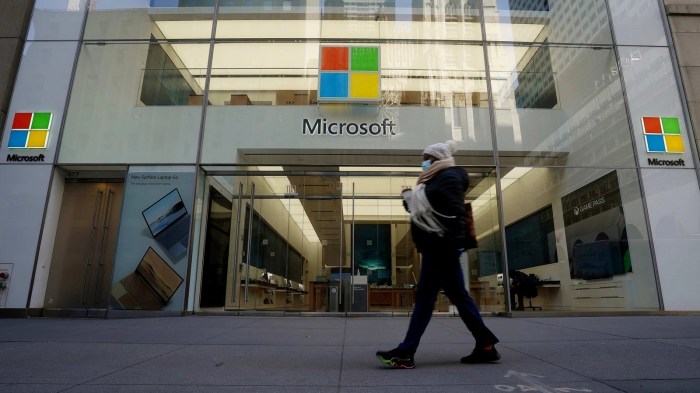Microsofts teams office bundling may breach eu competition rules – Microsoft Teams bundling with Office products may breach EU competition rules, raising concerns about potential market dominance and unfair advantages. The European Union’s scrutiny of Microsoft’s bundling practices is not new, with a history of antitrust investigations against the tech giant.
This time, the focus is on Microsoft Teams, a popular collaboration platform, and whether its integration with Office products could stifle competition and harm consumers.
The EU’s competition rules aim to ensure a level playing field for businesses and protect consumers from unfair practices. Bundling, the practice of offering multiple products together, can be problematic if it restricts consumer choice or creates barriers to entry for competitors.
Critics argue that Microsoft Teams bundling could lock users into the Microsoft ecosystem, making it difficult for other collaboration tool providers to compete.
Microsoft Teams Bundling and EU Competition Rules

Microsoft Teams, a popular collaboration platform, is often bundled with other Office products, raising concerns about potential breaches of EU competition rules. This bundling practice involves offering Microsoft Teams as part of a package deal alongside other products like Microsoft Word, Excel, and PowerPoint, often at a discounted price.
This strategy can be attractive to consumers, but it raises questions about its impact on competition within the market.
EU Competition Rules and Bundling
The European Union’s competition rules aim to ensure a level playing field for businesses and prevent anti-competitive practices that can harm consumers. These rules are Artikeld in the Treaty on the Functioning of the European Union (TFEU), specifically Article 101 and 102, which prohibit anti-competitive agreements and abuse of a dominant market position, respectively.
Bundling practices, when they restrict competition, can fall under these rules.
Arguments for and Against Microsoft Teams Bundling
The potential for Microsoft Teams bundling to violate EU competition rules is a complex issue with arguments on both sides.
Arguments Against Bundling
- Reduced Competition:Bundling can make it difficult for competitors to enter the market or compete effectively. When Microsoft Teams is bundled with other popular Office products, it becomes more difficult for standalone collaboration platforms to attract customers, as they would need to offer a similar package at a competitive price.
This can stifle innovation and limit consumer choice.
- Predatory Pricing:Bundling can be used as a form of predatory pricing. By offering Teams at a discounted price when bundled with other products, Microsoft could potentially drive down prices for its competitors, making it difficult for them to remain profitable. This could ultimately lead to the elimination of competitors from the market, leaving Microsoft with a dominant position.
- Lock-in Effect:Bundling can create a lock-in effect for consumers. Once a consumer has purchased a bundled package, they may be less likely to switch to a competitor’s product, even if it offers better features or a lower price. This is because they would need to purchase a whole new package of products, rather than just a single product.
Arguments for Bundling
- Economies of Scale:Bundling can allow Microsoft to achieve economies of scale, which can benefit consumers through lower prices. By offering a package deal, Microsoft can reduce its production and distribution costs, potentially leading to lower prices for consumers.
- Convenience for Consumers:Bundling can be convenient for consumers, as they can purchase all the products they need in one package. This can save consumers time and effort, especially for businesses that require a suite of productivity tools.
- Bundling as a Marketing Strategy:Bundling can be an effective marketing strategy. By offering a bundled package, Microsoft can attract new customers who may not have previously considered purchasing individual products. This can help to increase market share and generate more revenue.
Potential Impacts of Bundling
Bundling Microsoft Teams with other Office products raises concerns about its potential negative impacts on the market for collaboration tools. This practice could create an unfair advantage for Microsoft and hinder competition from other providers, potentially stifling innovation and limiting choices for consumers.
Potential Negative Impacts on the Market for Collaboration Tools
Bundling Microsoft Teams with other Office products could create a number of negative impacts on the market for collaboration tools. For example, it could:
- Reduce consumer choice: By making Teams the default option for users who purchase Office, Microsoft could limit the ability of consumers to choose alternative collaboration tools that may better suit their needs. This could lead to a situation where consumers are stuck with Teams even if they prefer a different solution.
- Hinder innovation: Bundling Teams with Office could discourage other providers from investing in the development of new and innovative collaboration tools. Knowing that Microsoft has a significant advantage due to its bundling strategy, smaller companies may be hesitant to compete, leading to less innovation in the market.
- Increase Microsoft’s market dominance: By bundling Teams with Office, Microsoft could further increase its market share in the collaboration tools market. This could lead to a situation where Microsoft has a dominant position in the market, making it difficult for other companies to compete.
How Bundling Could Create Unfair Advantages for Microsoft
Microsoft’s bundling strategy could create a number of unfair advantages for the company. For example, it could:
- Reduce the cost of acquiring new customers: By bundling Teams with Office, Microsoft can acquire new customers for its collaboration tool without having to invest in separate marketing and sales efforts. This can give Microsoft a significant cost advantage over its competitors.
- Increase the perceived value of Teams: By bundling Teams with Office, Microsoft can make its collaboration tool appear more valuable to consumers. This can make it more difficult for competitors to compete, as they may have to offer a significantly better product to attract customers.
- Create a barrier to entry for new competitors: Bundling Teams with Office can create a barrier to entry for new competitors in the collaboration tools market. New companies would have to offer a significantly better product or a significantly lower price to attract customers from Microsoft.
Hypothetical Scenario Illustrating How Microsoft Teams Bundling Could Disadvantage Smaller Competitors
Imagine a small startup developing a cutting-edge collaboration tool that offers innovative features and a user-friendly interface. This startup is competing with Microsoft Teams, which is bundled with Office and enjoys a large user base. Despite offering a superior product, the startup faces significant challenges.
It has to invest heavily in marketing and sales to reach potential customers, while Microsoft benefits from the bundled nature of Teams. As a result, the startup struggles to gain market share and ultimately may be forced to close down, despite its superior product.
Historical Context and Precedents: Microsofts Teams Office Bundling May Breach Eu Competition Rules

The current investigation into Microsoft’s bundling of Microsoft Teams with its Office suite has sparked discussions about potential antitrust concerns. To understand the context of this situation, it’s essential to examine the historical precedent of EU antitrust actions against Microsoft, specifically focusing on its bundling practices.The European Union has a history of scrutinizing Microsoft’s business practices, particularly its bundling strategies, due to their potential to stifle competition and limit consumer choice.
Examining these past cases helps to illuminate the potential implications of the current Microsoft Teams investigation.
EU Antitrust Actions Against Microsoft: A Timeline
The EU’s history of antitrust actions against Microsoft is characterized by a series of investigations and rulings, highlighting a pattern of scrutiny regarding the company’s bundling practices.
- 1998:The European Commission initiated its first major antitrust investigation against Microsoft, focusing on the company’s dominant position in the operating system market and its alleged bundling of its web browser, Internet Explorer, with its Windows operating system. The investigation found that Microsoft had abused its dominant position and imposed unfair conditions on its competitors.
- 2004:Following the 1998 ruling, Microsoft was again investigated by the EU for bundling its Windows Media Player with its Windows operating system. The Commission concluded that Microsoft had abused its dominant position by unfairly promoting its own media player and hindering competition in the digital media player market.
- 2007:Microsoft was once again investigated by the EU for failing to comply with the 2004 ruling, specifically regarding its failure to provide competitors with access to essential interoperability information. The Commission imposed a significant fine on Microsoft for its non-compliance.
- 2013:The EU launched an investigation into Microsoft’s licensing practices for its server operating system, Windows Server. The investigation focused on Microsoft’s bundling of its server operating system with its other software products, potentially hindering competition in the server operating system market.
Comparing and Contrasting Microsoft Teams Bundling with Past Cases
The current investigation into Microsoft’s bundling of Microsoft Teams with its Office suite shares similarities with previous antitrust cases against the company, particularly regarding the potential for market dominance and competitive harm.
- Market Dominance:Microsoft holds a dominant position in the office productivity software market, with its Office suite being widely used by businesses and individuals. The bundling of Microsoft Teams with Office could potentially strengthen Microsoft’s market power, potentially leading to a reduction in competition in the collaborative communication and video conferencing market.
- Competitive Harm:The bundling of Microsoft Teams with Office could potentially disadvantage competitors in the collaborative communication and video conferencing market. Competitors might struggle to gain market share if they cannot offer a comparable bundled solution, potentially leading to a reduction in consumer choice and innovation.
Potential Parallels Between Microsoft Teams Bundling and Past Cases
The current Microsoft Teams situation bears resemblance to past cases involving Microsoft’s bundling practices, particularly in terms of the potential for market dominance and competitive harm. The EU’s previous rulings against Microsoft, particularly those related to bundling practices, provide a framework for understanding the potential antitrust concerns surrounding the Microsoft Teams situation.
Investigate the pros of accepting swiss scientists figured out how to stop your glasses from fogging up in your business strategies.
- Dominant Position:Similar to previous cases, Microsoft’s dominant position in the office productivity software market could be leveraged through the bundling of Microsoft Teams with Office, potentially creating an unfair advantage over competitors.
- Exclusionary Practices:The bundling of Microsoft Teams with Office could potentially hinder the ability of competitors to compete effectively in the collaborative communication and video conferencing market. This could lead to a reduction in consumer choice and innovation, as competitors might struggle to gain traction without a comparable bundled solution.
Potential Remedies and Solutions
If the EU finds Microsoft Teams bundling to be in violation of competition rules, it will need to consider appropriate remedies to ensure a level playing field for competitors and protect consumer choice. This section explores potential remedies the EU could consider and alternative solutions Microsoft could implement to address competition concerns.
EU Remedies
The EU has a range of remedies at its disposal to address anti-competitive practices, including:
- Fines:The EU can impose substantial fines on Microsoft for violating competition rules. These fines can be a significant deterrent and act as a financial penalty for anti-competitive behavior.
- Behavioral Remedies:The EU can order Microsoft to change its behavior to address the competitive concerns. This could include unbundling Microsoft Teams from other Office products, offering Teams as a standalone product, or providing competitors with access to Microsoft’s APIs.
- Structural Remedies:In extreme cases, the EU could require Microsoft to divest parts of its business, such as its Teams product or its Office suite, to create a more competitive market. This is a drastic measure usually reserved for situations where behavioral remedies are deemed insufficient.
Alternative Solutions
Microsoft could proactively address competition concerns by implementing alternative solutions, including:
- Offering Teams as a standalone product:Microsoft could offer Teams as a separate product, allowing customers to choose whether to purchase it individually or as part of the Office suite. This would provide greater flexibility for customers and create a more competitive market for collaboration software.
- Making Teams interoperable with other platforms:Microsoft could make Teams compatible with other collaboration platforms, allowing users to seamlessly switch between different services. This would increase competition and offer users more choices.
- Providing access to APIs for competitors:Microsoft could provide competitors with access to its APIs, enabling them to integrate their products with Teams and create a more interoperable ecosystem. This would increase competition and offer users more choices.
Potential Remedies and Their Impacts, Microsofts teams office bundling may breach eu competition rules
| Remedy | Pros | Cons | Potential Impact on Market |
|---|---|---|---|
| Fines | Deters future anti-competitive behavior, generates revenue for the EU. | May not address the underlying competition issue, can be costly for Microsoft. | May deter Microsoft from engaging in similar practices in the future, but may not directly impact the market structure. |
| Behavioral Remedies | Can effectively address competition concerns, provides a more targeted approach. | May be difficult to monitor and enforce, can be costly for Microsoft to implement. | Can create a more competitive market by providing greater choice and flexibility for customers. |
| Structural Remedies | Can effectively address competition concerns, can create a more competitive market. | Drastic measure, can be costly for Microsoft and disruptive to the market. | Can significantly alter the market structure by creating new competitors and increasing competition. |
Consumer Impact and Market Dynamics

The bundling of Microsoft Teams with other Microsoft Office products could have significant implications for consumers, potentially impacting their choices and pricing. Examining the potential impact on the market for collaboration tools is crucial, considering factors like innovation and competition.
Understanding the EU’s investigation’s potential implications on the future of Microsoft Teams and the broader collaboration software market is essential.
Impact on Consumer Choice and Pricing
Bundling Microsoft Teams with other Office products could limit consumer choice by making it difficult to acquire Teams independently. This could potentially disadvantage consumers who only need a collaboration tool and not the entire Office suite. Consumers might be forced to pay for features they do not require, leading to higher overall costs.
The potential impact on pricing could be multifaceted:
- Increased Costs:Consumers might be compelled to pay for the entire Office suite even if they only need Teams, leading to higher costs. This could particularly affect small businesses and individuals with limited budgets.
- Limited Flexibility:Bundling could restrict consumer choice by limiting the ability to purchase Teams independently. This could hinder the adoption of Teams by users who prefer a standalone solution.
- Potential for Price Increases:Bundling could potentially lead to price increases for the Office suite as Microsoft could leverage its market power to raise prices. This could further disadvantage consumers who need only Teams.
Impact on Market Innovation and Competition
The bundling of Microsoft Teams could have a significant impact on the overall market for collaboration tools. This could potentially hinder innovation and competition by:
- Reduced Competition:Bundling could stifle competition from other collaboration tool providers. By making it difficult for consumers to access competing products, Microsoft could potentially gain a dominant market share.
- Limited Innovation:Bundling could discourage innovation in the collaboration tool market. With Microsoft holding a dominant position, other providers might find it challenging to compete and invest in developing new features.
- Potential for Market Domination:Bundling could lead to Microsoft’s dominance in the collaboration software market. This could potentially stifle innovation and harm consumer choice.
Implications of the EU Investigation
The EU’s investigation into Microsoft’s bundling practices could have significant implications for the future of Microsoft Teams and the broader collaboration software market. The potential outcomes include:
- Unbundling Requirements:The EU might require Microsoft to unbundle Teams from its Office suite, allowing consumers to purchase it independently. This would promote competition and choice in the market.
- Fines and Penalties:If the EU finds Microsoft’s bundling practices to be anti-competitive, it could impose fines and penalties. This could deter Microsoft from engaging in similar practices in the future.
- Increased Scrutiny:The investigation could lead to increased scrutiny of Microsoft’s business practices. This could potentially impact the company’s future strategies and product offerings.





